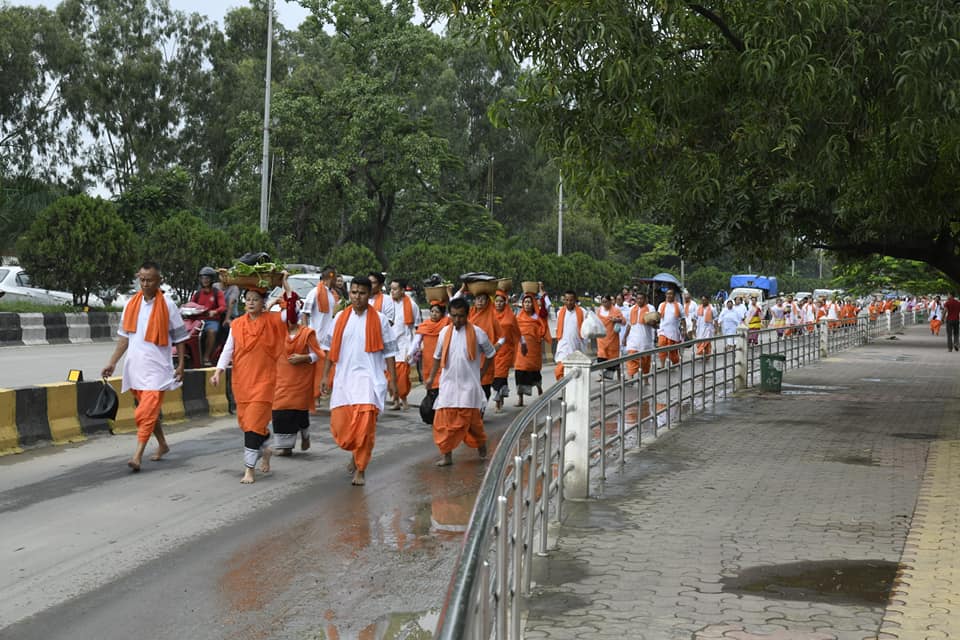The Chiru tribes and Meitei have similar religious beliefs. They also worship Sidaba Mapu, known as Lamba Patheiin, and supreme house diety Sanamahi as Inroureii.
Much like the Meitei people, the Chiru tribe also has a seven-clan system called “Yek Salai.” However, their journey towards Christianity and differences in religious beliefs have caused them to gradually forget some of their traditional customs and history.
Nevertheless, some Chiru elders still hold strong beliefs in their Supreme deity, known as “Lamba Pathiein.” They believe that this deity assigned specific tasks for each of the seven days in a week, corresponding to the Chiru’s seven clans.
However, over time, the Chiru have forgotten two of these original seven clans. They now remember only five: Danla (similar to Mangang in Meitei), Raja (Luwang), Dingthoi (Khuman), Chongdur (Angom), and Shampar (Kha Nganba). The Moirang and Chenglei Sarang Leisangthem clans have faded from the Chiru tribe’s memory and traditions.
The religious beliefs of the Chiru tribe in Manipur have been shaped over many generations and passed down through spoken traditions since the tribe’s beginnings. According to these tribal beliefs, they hold a supreme deity in high regard, known as “Lamba Patheiin.” This deity is attributed to the creation of the entire universe, including celestial bodies like the sun, moon, stars, Earth, and all living beings, including humans.
In Meitei Sanamahism, a similar faith in a supreme deity exists, known as Aitya Kuru Sidaba or Sidaba Mapu. Lamba Patheiin is believed to possess all-encompassing knowledge, omnipresence, and ultimate power, serving as the master of the entire universe. The Chiru tribe has been faithfully worshipping and venerating Patheiin since ancient times.
The Chiru tribe also has their own household deity, known as “Inroureii,” which shares some similarities with the Meitei people’s Lainingthou Sanamahi. This traditional family worship used to take place between the months of July and September before the conversion to Christianity. Nowadays, it occurs during the winter months of December and January. It’s worth noting that the Meitei people also have their own rituals, like Lainingthou Sanamahi Cheng Hongba, which they perform during the months of June and July.
Worshipping Inroureii is highly significant for every member of the Chiru tribe. Unlike the Meitei tradition of Lainingthou Sanamahi, the Chiru place their deity in the center of their homes, often represented as a pole or pillar. While they may not worship daily, there’s a special occasion when every Chiru family gathers to pay their respects to Inroureii.
This practice has similarities with the Apokpa Khurumba tradition among the Meitei people. In this tradition, a priest known as Laishu Theiimpu, similar to the Amaiba in Meitei Sanamahi religion, leads the religious ceremonies and rituals.
Worshiping Inroureii serves various purposes for the Chiru. It helps protect them from evil spirits, ensures the well-being of their family members, and guards against negative influences. Essentially, it cleanses the lives of the Chiru people from harmful spirits.
Another essential aspect of the Inroureii worship is the “Sornom” or Laipao chenba ritual. This ritual aims to foresee the fortunes of every family member. It helps reveal potential events, both negative and positive, such as accidents, illnesses, deaths, and misfortunes, as well as moments of joy, happiness, success, and achievements within the family.
To conduct the “Sornom” ritual, the Chiru use the intestines of hens and the liver of a pig sacrificed during the Inroureii ceremony. These animal parts are preserved in a bamboo basket called “Kokvon,” placed at the kitchen altar. The Laishu Theiinpu closely examines these parts, looking for any defects or color changes. Based on his observations, he predicts the fortunes of each family member, while the pig’s liver foretells the family’s overall fortune.
Inrouireii worship happens once or twice a year, sometimes even thrice, depending on the family’s request. Attendance of all family members is mandatory, and each one offers a hen symbolizing themselves as part of the rituals.
The Chiru tribe practices various traditional rituals like the “Loipuishak Rathaikoui.” This annual ritual occurs in December and is translated as “calling of the soul by giving a feast to the soul.”
Editor | Signpost News






